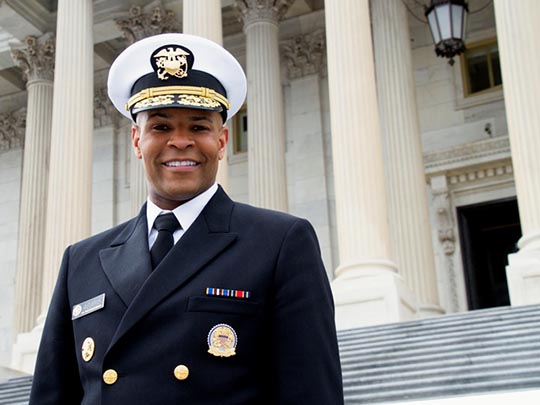Surgeon General Releases Advisory on Naloxone, an Opioid Overdose-Reversing Drug

Cross-posted from ASH Media Office
Urges more individuals to carry life-saving medication
Today, U.S. Surgeon General Jerome M. Adams, M.D., M.P.H., urged more Americans to carry a lifesaving medication that can reverse the effects of an opioid overdose.
The medication, naloxone, is already carried by many first responders, such as EMTs and police officers. The Surgeon General is now recommending that more individuals, including family, friends and those who are personally at risk for an opioid overdose, also keep the drug on hand.
An estimated 2.1 million people in the U.S. struggle with an opioid use disorder. Rates of opioid overdose deaths are rapidly increasing. Since 2010, the number of opioid overdose deaths has doubled from more than 21,000 to more than 42,000 in 2016, with the sharpest increase occurring among deaths related to illicitly made fentanyl and fentanyl analogs (synthetic opioids).
Opioids are a class of drugs that include medications, such as oxycodone, hydrocodone and methadone, which are commonly prescribed to treat pain. Pharmaceutical fentanyl is a synthetic opioid which is 50 times more potent than heroin and 100 times more potent than morphine. It is approved for treating severe pain, typically post-surgical or advanced cancer pain. However, most recent cases of fentanyl-related harms are a result of illicitly made fentanyl.
“Each day we lose 115 Americans to an opioid overdose – that’s one person every 12.5 minutes,” said Surgeon General Adams. “It is time to make sure more people have access to this lifesaving medication, because 77 percent of opioid overdose deaths occur outside of a medical setting and more than half occur at home.”
Naloxone, an FDA-approved medication that can be delivered via nasal mist or injection, is not a long-term solution, but it can temporarily suspend the effects of the overdose until emergency responders arrive.
“To manage opioid addiction and prevent future overdoses, increased naloxone availability must occur in conjunction with expanded access to evidence-based treatment for opioid use disorder,” the Surgeon General said.
All states have passed laws to increase access to naloxone and, in most states, you can walk into a pharmacy and request naloxone even if you don’t already have a prescription. In addition, most states have laws designed to protect health care professionals for prescribing and dispensing naloxone from civil and criminal liabilities as well as Good Samaritan laws to protect people who administer naloxone or call for help during an opioid overdose emergency.
Naloxone is covered by most insurance plans and, for those without coverage, may be available at low or no cost through local public health programs or through retailer and manufacturer discounts. It is easy to use, safe to administer and widely available.
Today’s Surgeon General advisory on naloxone is part of the administration’s ongoing effort to respond to the sharp increase among drug overdose deaths. Just last month, the Centers for Disease Control and Prevention released new data showing a rise in emergency department visits for opioid overdoses. From July 2016 through September 2017, opioid overdoses increased 30 percent in all parts of the U.S.
Expanding the use of the overdose-reversing drug naloxone is a key part of the public health response to the opioid crisis, along with effective prevention, treatment and recovery programs for opioid use disorder. Research shows a combination of medication, counseling and behavioral therapy, also known as Medication Assisted Treatment, or MAT, can help people achieve long-term recovery.
For more information on how to get help, call SAMHSA’s National Helpline at 1-800-662-HELP (4357) or go to https://findtreatment.samhsa.gov to find a treatment center.
To learn more about how individuals can recognize and respond to an opioid overdose, visit www.surgeongeneral.gov to read more.